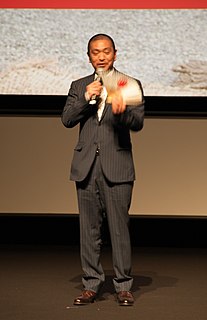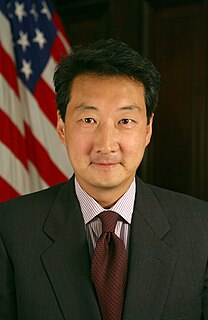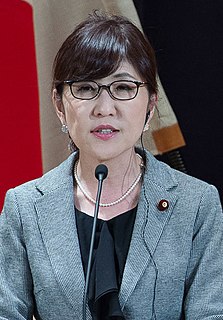Related Research Articles

The foreign relations of Japan are handled by the Ministry of Foreign Affairs of Japan.

North Korea, officially the Democratic People's Republic of Korea (DPRK), is a country in East Asia. It constitutes the northern half of the Korean Peninsula and shares borders with China and Russia to the north, at the Yalu (Amnok) and Tumen rivers, and South Korea to the south at the Korean Demilitarized Zone. The country's western border is formed by the Yellow Sea, while its eastern border is defined by the Sea of Japan. North Korea, like its southern counterpart, claims to be the legitimate government of the entire peninsula and adjacent islands. Pyongyang is the capital and largest city.

South Korea maintains diplomatic relations with 191 countries. The country has also been a member of the United Nations since 1991, when it became a member state at the same time as North Korea. South Korea has also hosted major international events such as the 1988 Summer Olympics and 2002 World Cup Soccer Tournament and the 2011 IAAF World Championships Daegu South Korea. Furthermore, South Korea had hosted the 2018 Winter Olympics which took place in Pyeongchang, South Korea from 9 to 25 February.
Kazuhide Uekusa is a Japanese economist, economic analyst, former senior economist at Nomura Research Institute, and chairman of the Three-Nations Research Institute. He was arrested in 2004 and 2006 for sex offences.
The six-party talks aimed to find a peaceful resolution to the security concerns as a result of the North Korean nuclear weapons program. There was a series of meetings with six participating states in Beijing:

Phoenix Wright: Ace Attorney is a visual novel adventure game developed by Capcom Production Studio 4 and published by Capcom. It was released in 2001 for the Game Boy Advance in Japan and has been ported to multiple platforms. The 2005 Nintendo DS version, titled Gyakuten Saiban Yomigaeru Gyakuten in Japan, introduced an English language option, and was the first time the game was released in North America and Europe. It is the first entry in the Ace Attorney series; several sequels and spin-offs were produced, while this game has seen further ports and remasters for computers, game consoles, and mobile devices.

For over 15 centuries, the relationship between Japan and Korea was characterized by cultural exchanges, economic trade, political contact and military confrontations, all of which underlie their relations even today. During the ancient era, exchanges of cultures and ideas between Japan and mainland Asia were common through migration via the Korean Peninsula, and diplomatic contact and trade between the two.

Hitoshi Matsumoto, commonly known as Matchan, is a Japanese film director and one of Japan's most popular comedians and TV hosts. He is one half of the comedy duo Downtown alongside Masatoshi Hamada. Like Hamada, Matsumoto was born and raised in Amagasaki, Hyōgo Prefecture.

International relations between South Korea and the United States commenced in 1950, when the United States helped establish the modern state of South Korea, also known as the Republic of Korea, and fought on its UN-sponsored side in the Korean War (1950–1953). During the subsequent four decades, South Korea experienced tremendous economic, political and military growth.

Diplomatic relations between the People's Republic of China (PRC) and the Republic of Korea were formally established on August 23, 1992. Before then, the PRC recognized only the Democratic People's Republic of Korea while South Korea in turn recognized only the Republic of China (Taiwan). South Korea was the last Asian country to establish relations with the People's Republic of China. In recent years, China and South Korea have endeavored to boost their strategic and cooperative partnership in numerous sectors, as well as promoting a high level relationship. Trade, tourism and multiculturalism, specifically, have been the most important factors of strengthening two neighbouring countries cooperative partnership. Despite this, historical, political and cultural disputes have still played several roles on the relations between South Korea and China.

Russia–South Korea relations or Russian–South Korean relations are the bilateral foreign relations between Russia and South Korea. Modern relations between the two countries began on September 30, 1990.

Victor D. Cha is an American academic, author and former national foreign policy advisor.

Tomomi Inada is a Japanese lawyer and politician serving as a member of the Japanese House of Representatives, representing the 1st Fukui Prefecture since September 2005. She previously served as the 14th Japanese Minister of Defense from August 2016 to July 2017, resigning in response to a cover up scandal within the Japanese Ministry of Defense. She spent time as the Chairwoman of the Policy Research Council of the Liberal Democratic Party in her fourth term as a member of the House of Representatives in the Diet. She is a native of Fukui Prefecture.

Korean ethnic nationalism, or Korean racial nationalism, is a racial, chauvinist and ethnosupremacist political ideology and a form of ethnic and racial identity that is widely prevalent by the Korean people in Korea, particularly in South Korea. It is based on the belief that Koreans form a nation, a race, and an ethnic group that shares a unified bloodline and a distinct culture. It is centered on the notion of the minjok, a term that had been coined in Imperial Japan ("minzoku") in the early Meiji period. Minjok has been translated as "nation", "people", "ethnic group", "race", and "race-nation".

Japan–North Korea relations refers to international relations between Japan and North Korea. Relations between Japan and North Korea have never been formally established, but there have been diplomatic talks between the two governments to discuss the issue of kidnapped Japanese citizens and North Korea's nuclear program. Relations between the two countries are severely strained and marked by tension and hostility. According to a 2014 BBC World Service poll, 91% of Japanese people view North Korea's influence negatively, with just 1% expressing a positive view; the most negative perception of North Korea in the world.

The Philippines–South Korea relations refers to the bilateral relations between the Republic of the Philippines and the Republic of Korea. The Philippines has an embassy in Seoul, while South Korea has an embassy in Manila. The relationship between the Philippines and South Korea can be classified as strong as the two countries have historically been and continue to be close diplomatic and military allies. They are also significant economic partners in terms of trade, immigration, and tourism. They are both close allies of the United States.

Yuri Nakamura is a Japanese actress and former singer. Her real name is Yuri Sei or Woori Song.

Niigata 1st district is a constituency of the House of Representatives in the National Diet of Japan, represented by Chinami Nishimura of the Constitutional Democratic Party of Japan since 2017. It is located in Niigata City, the capital of Niigata Prefecture, and covers central parts of former Niigata City. It has the smallest district area among the House districts in Niigata Prefecture. As of 2017, 439,968 eligible voters were registered in the district

Yasumasa Nagamine is a Japanese jurist who has served as an associate Justice of the Supreme Court of Japan since 2021.
References
- ↑ Yang Sung-chul (1999). The North and South Korean political systems: A comparative analysis (rev. ed.). Seoul: Hollym. ISBN 1-56591-105-9
- ↑ 『元朝鮮人従軍慰安婦 戦後半世紀重い口開く (ソウル10日発 植村隆 ja:植村隆)』
- ↑ 韓国・遺族会裁判の最高裁判決言渡 (in Japanese). Nov 29, 2004. Retrieved 2007-12-28.
- ↑ "HTML 文書" (in Japanese). Mof.go.jp. Archived from the original on 2009-06-26. Retrieved 2009-05-07.
- ↑ "Koizumi urges S. Korea to support Japan's UNSC bid | Asian Political News | Find Articles at BNET". Findarticles.com. April 4, 2005. Retrieved 2009-05-07.[ dead link ]
- ↑ "Breaking News English ESL Lesson Plan on South Korea". Breakingnewsenglish.com. 2005-04-02. Retrieved 2009-05-07.
- ↑ Frederick, Jim (2006-05-01). "Rocky Relations". TIME. Archived from the original on April 14, 2009. Retrieved 2009-05-07.
- ↑ "U.S. Demands Apology for 'Comfort Women'". NPR. 2007-07-31. Retrieved 2016-08-28.
- ↑ "Japan to tighten export rules for high-tech materials to South Korea: media". Reuters. July 1, 2019.